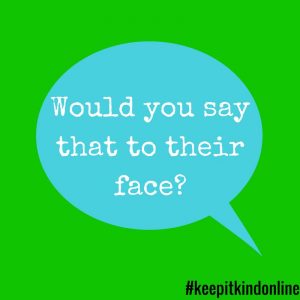Keep It Kind Online is a campaign that looks to address bullying and harassment online, and asks participants to pledge to not participate in, and to confront, these behaviours.
My first question is: how?
I would say the main issue here is that the people who perpetuate those behaviours are not the ones who are going to participate in a campaign like this. Most of the time, those people don’t see anything wrong with what they’re doing. And the people who do want to be participate or confront are often vulnerable, meaning they’re less likely to be able to stand up for themselves or others.
Keep It Kind launched on 7 June with a flurry of blogposts, tweets and hashtags. Founders Christina and Jenn write: “As we spend more of our lives online there seems to be an increasing gap between our online behaviour and our real life behaviour.

The internet can be a place where we are less inhibited than when we are face to face with people in real life. Sometimes this is great and allows us to explore things we might otherwise not talk about. But unfortunately for a small minority of internet users this lack of inhibition means that they can comment with vitriol, make personal attacks, offend and hurt people with the things they say. We want to share the message that this sort of commenting is offensive and should not be tolerated.”
The internet can be a big, scary place, and as someone who has been the focus of these behaviours, I can personally attest to how deeply disturbing they are.
I’ve experienced the full gamut of “unkindness,” from people accusing me of faking my illness for money, through to the usual name-calling and shouting down. I recently made the mistake of joining a public Facebook group to advertise a room in my house. I had an inkling that I was asking for trouble, but I figured, how bad could it be?
Within minutes, I was accused of ripping people off and being told I was “dreaming.” Comments flooded in, suggesting that I was asking for far more than the room was worth in order to make money. It floored me to have my character attacked so bluntly. Yes, the room is a certain price. So is the house. That’s just what it’s worth. Rent is expensive right now. Who knew?
Within 24 hours, I took the post down and exited the group, because every new notification was giving me panic attacks. I couldn’t understand what these people hoped to achieve. Did they think their nastiness would browbeat me into magically making the rent less, and I would turn around and offer one of these wonderful, kind people who were showing me the error of my ways, a place to live? No. They just needed to have an opinion.
As a friend said to me recently, “The internet is built on the outcry “Why wasn’t I consulted?!”
And she’s right. People act with outrage and flippancy, and unfortunately the internet enables what is often just unnecessary harm.

So what do we actually do?
It’s easy to agree that this sucks. We shouldn’t have to put up with it. But how do we stop it from happening – and can we? Or is just human nature to use what little power you have to attack others? I’d like to think not, but I’m not entirely convinced. It’s just far too prevalent for us to put it down to a few nasty individuals. In fact, half the time the problem is that is becomes “pack” behaviour.
And, unfortunately, the solutions do involve putting yourself in the firing line – if you’re not in it already.
Thalia Kehoe Rowden suggests these steps, from the post THIS IS NOT OKAY. Okay?
1. Call out nastiness when you see it.
Whenever you see a nasty comment, leave a reply that says something like ‘Gosh, that’s a mean thing to say to someone you don’t know!’ I’ve never once had anyone reply to me after that, so it seems like a safe-ish tactic.
We need to call people out on their bad behaviour.
2. Put pressure on moderators to lift their game
Take a few minutes to appeal to organisations where bad commenting behaviour proliferates.
Email the editors of newspaper websites. Tell them you don’t think their moderation is adequate, and you will be voting with your feet. For as long as there is no improvement, stop visiting sites that are breeding grounds for incivility, where they don’t moderate comments adequately. Unlike their Facebook pages, unfollow their social media feeds.
Think about what sites you choose to follow regularly, on social media and via their websites. Do they moderate their comments responsibly? Vote with your clicking.
3. Leave kind and supportive comments wherever you see nastiness.
On the original McDonald’s post there were as many ‘likes’ and ‘loves’ as there were comments, but the people who bothered to write anything were nasty, rather than nice, at a ratio of about 9:1.
You can dilute the nastiness by speaking up. It discourages people from piling on if they see they might not be in the majority, and it tells the content creators that the mean people aren’t the only ones reading.
It’s also good to hit ‘like’ on positive comments, making them more prominent, but adding real words is even better.
Co-founder of Keep It Kind Christina Baird wrote some key foundations for considerate online interacting, which I’ve edited down a little here. I found these quite good, because as I mentioned above, a lot of the time people are in vulnerable positions, and they’re not in a place where they can safely speak up for others. (If you’ve ever tried to defend someone in the middle of a shark attack on social media, you’ll know what I’m talking about). But these are more about how you can think about things yourself.
Four key foundations for considerate interactions online
- Allow For Learning
In some ways, the internet is a huge big learning space because none of us were taught how to interact online. We are all learning how to put our ideas across, we are learning how to interact wisely with others. No matter our intentions we will make mistakes (especially when we are trying to reduce things down to 140 characters). It is ok to make mistakes, we don’t have to be perfect all the time even if we are a ‘public’ persona. We need to be a bit more generous and forgiving of people that get things wrong in an online interaction. Especially people who are open enough to apologise or edit their mistake when it is pointed out to them. We learn from making mistakes, we need to give people space to grow and to learn from our difference and challenges.
2. My Normal Is Not Your Normal
We have so many assumptions and expectations that are based on who we are and our experiences and preferences, and personality. Often we expect that someone else feels or experiences things in the same way that we do. We may expect others to find the same things funny that we do. If we are not hurt easily we might expect that others are not hurt easily. But that is not the case, we are all very different. A step to kindness may be being able to step beyond our expectations and allow others to be different to ourselves. That means that other people get to name when they feel hurt by a comment and we respect and acknowledge that because we recognise that their normal is not our normal.
3. Passionate Diversity Is A Good Thing
As our world becomes more diverse we seek to affirm our normality and we actually protect ourselves from experiencing diversity. We become less experienced at disagreeing and debating well. This is coupled with a tolerance mentality where it seems the latest PC concept is that we are meant to tolerate difference of opinion without trying to persuade others to agree with us. This must be making it very hard for politicians in this election year. I am not sure how we hold all this together, and debate ideas robustly and create open minds to let others try and persuade us with the quality of their argument, and respect peoples rights to believe different things. Considerate interactions allow people to express their ideas with passion and commitment, they allow diversity and persuasion without expressing intolerance.
4. Acknowledge Disinhibition
Psychologists think that some of what happens online is because the technological environment creates a disinhibiting effect on peoples behaviour. There is some anonymity online, and other people don’t feel quite real to us, especially when we have never met them. This can be a great thing. Personally I feel much more comfortable discussing infertility online than in person. It has allowed some big issues to be talked about like sexual abuse, miscarriage and post-natal depression that somehow seemed much harder to talk about in real life. BUT if other people don’t feel real to us, if we are not looking them in the eye, it allows us to let go of the inhibition that stops us hurting people, or being deliberately spiteful. We all need to have a greater awareness that the lack of personal immediate feedback in the online environment may be influencing how we are expressing ourselves.
WHAT NEXT?
The Keep It Kind team have said they’re not sure where to take the campaign next. They made a really wonderful start and I am totally behind everything they’re standing for. Their website has ways to get in touch with them if you have ideas or thoughts. As a former PR person, I wonder whether or not a brand might want to get involved in something like this to take it to the next level. It’d look good for them, the hashtag is catchy and already catching on – I could see it being a great opportunity. Whether or not the team want to go in that sort of direction is over to them I guess.
In the meantime. Keep it kind.
Links
Keep It Kind Online campaign website
Keep it kind – what does kindness mean? (Written by Christina)
Keep it kind – This is not okay. Okay? (Written by Thalia from Sacraparental)
Jenn – The Campground Kid
Christina – Bread and Pomegranates
